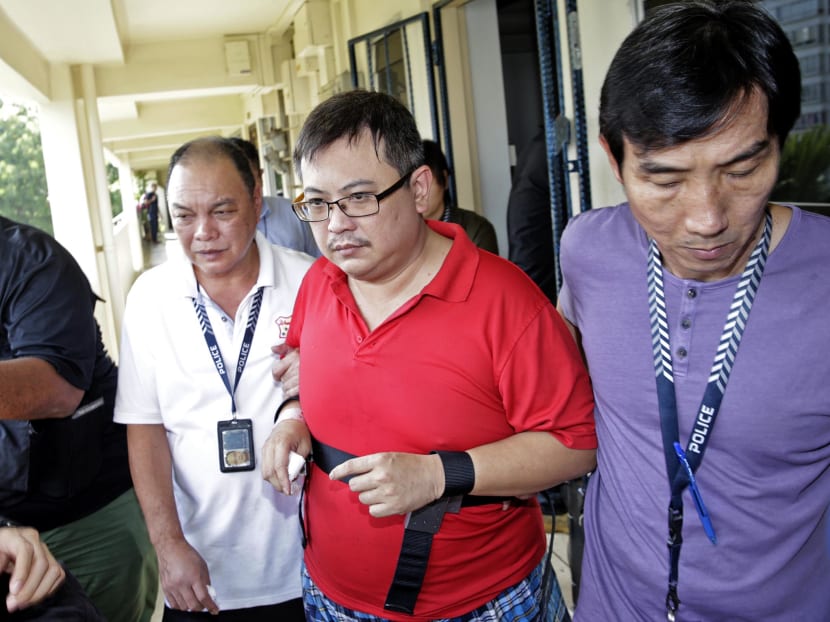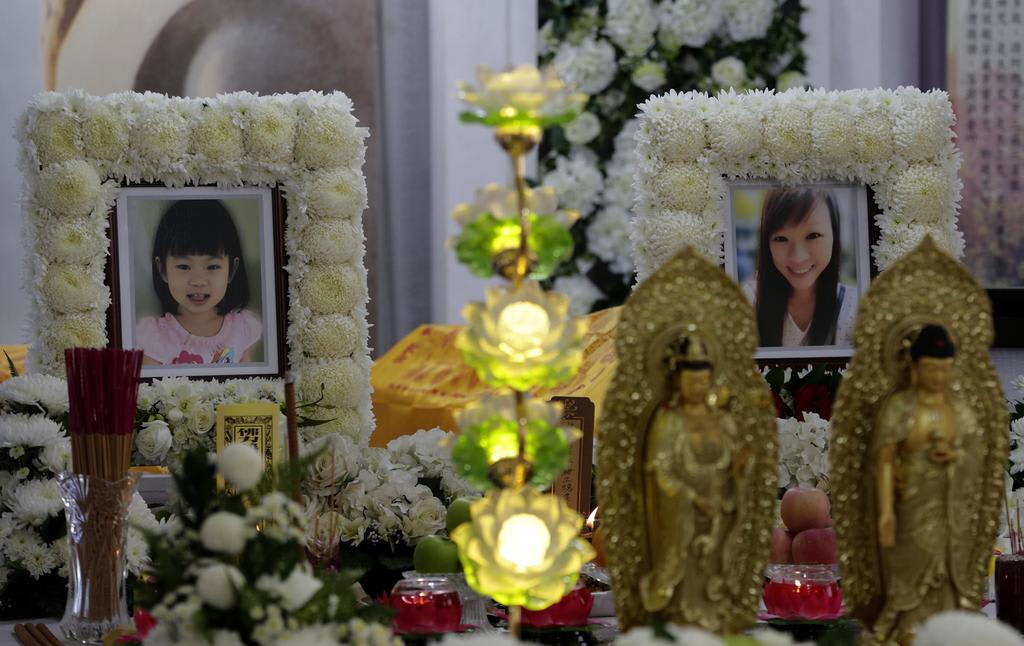Woodlands double murder: Man to hang after losing apex court appeal for killing daughter, pregnant wife
SINGAPORE — A 46-year-old former property agent has lost his appeal against his murder conviction for killing his pregnant wife and young daughter in their Woodlands flat in 2017, condemning him to the death sentence.

Woodlands murder suspect Teo Ghim Heng (second from right) being escorted back to the crime scene on Feb 10, 2017.
- Teo Ghim Heng, 46, admitted killing his wife and 4-year-old daughter in 2017
- He was sentenced to death in 2020 but mounted an appeal against his murder conviction
- His lawyers argued that he should be convicted of a less serious charge as his major depressive disorder impaired his judgement
- The Court of Appeal largely agreed with the High Court in rejecting these arguments
SINGAPORE — A 46-year-old former property agent has lost his appeal against his murder conviction and sentence for killing his pregnant wife and young daughter in their Woodlands flat in 2017, condemning him to the hangman's noose.
Five judges in the Court of Appeal on Wednesday (Feb 23) rejected Teo Ghim Heng’s rehashed arguments that he had suffered from a mental disorder, which substantially impaired his mental responsibility at the time of the murders.
The apex court agreed that Teo had failed to satisfy at least five of the symptoms required to come to a diagnosis of major depressive disorder, including have depressed mood for most of the day, suffering from insomnia or hypersomnia (excessive sleepiness) nearly every day, and having feelings of worthlessness or guilt.
Teo was handed the mandatory death penalty in the High Court in November 2020, after he was found guilty of two counts of murder under Section 300(a) of the Penal Code.
A third charge of causing the death of his unborn son was withdrawn then.
Teo confessed to strangling to death his wife Choong Pei Shan — who was six months' pregnant — and their four-year-old daughter. The avid gambler was facing mounting pressure to pay off more than S$120,000 in debts and also owed two months of the girl’s preschool fees.
He had borrowed money from friends and taken up a new job after the property market slowed down.
Teo and his wife argued on the morning of Jan 20 in 2017 over their daughter’s preschool fees. She berated him for being a useless father and husband in front of their daughter, which led to him strangling both of them to death with a bath towel and his bare hands.
He claimed to have done so with the intention of committing suicide after, as he felt he had no way for the family to repay the debts he owed.
He also reasoned that his daughter would not have anyone to take care of her with both parents dead and he did not want her to suffer the consequences of his debts.
Afterwards, he burnt their bodies in a bedroom at their Woodlands flat and fended off her family members for the next week or so, until her brother went over on the first day of Chinese New Year and realised something was amiss.

COURT OF APPEAL'S DECISION
Justice Judith Prakash, who delivered the apex court’s judgement, agreed with High Court judge Kannan Ramesh that Teo did not satisfy the criteria of major depressive disorder.
If he did and it had substantially impaired his mental responsibility and judgement for the killings, this would give rise to a defence of diminished responsibility.
The apex court also rejected arguments by Teo’s lawyers, led by Mr Eugene Thuraisingam and Mr Johannes Hadi, that certain murder provisions under the Penal Code were unconstitutional.
Justice Prakash pointed out that an appellate court “will be slow” to criticise the findings of a lower court “without good reason”.
On behalf of the appeal judges, she also stressed that when an accused person contends that he suffers from an abnormality of mind, then offers an expert's medical opinion that is based largely on self-reported symptoms, the court must carefully assess these symptoms in light of information from those who would usually interact with the accused.
The apex court said that the High Court was right in relying on evidence from Teo’s work supervisor and former colleague, who had testified that they did not observe depressed mood on Teo’s part.
As for any feelings of worthlessness, or excessive or inappropriate feelings of guilt, nearly every day, Justice Prakash said that Teo did not display this as he was actively trying to reverse his fortunes.
He had put his flat up for sale to raise more money and the couple had also decided against aborting their second child in 2016 after seeing a counsellor.
Another criteria Teo was required to satisfy was a diminished ability to think or concentrate nearly every day, either from an objective account or observed by others.
Justice Prakash said that his self-reported accounts of symptoms were “inconsistent with his stellar performance at work and ability to cover his tracks and lay a false trail following his offences”.
His steps to avoid detection following the killings, including running the air-conditioning unit to slow down decomposition and buying an air freshener to mask the smell, indicated that he had “presence of mind and did not suffer from diminished cognitive ability”, Justice Prakash added.
He had also logged into his wife’s Facebook account and changed her cover photo to give a false impression that she was still alive.
On the eve of Chinese New Year, he lied to family members that Choong had stomach pains and needed to visit the hospital.
The authorities arrested him the next day after her brother went over to their home and sensed something was amiss.
Teo lied to officers at the scene that he had entered into a suicide pact with his wife before admitting in his later statements that he strangled both of the victims to death.
He also showed officers four suicide notes, some of which he had forged to look like his wife wrote them.
After the court hearing was over on Wednesday, Teo was given time to speak to some family members.
His lawyers confirmed with TODAY that his last move will be seeking clemency from President Halimah Yacob.











